
How to Spend a Literary Long Weekend in Chicago
Lynn Haller Suggests Live Lit, Bookstores with Dogs, and
a Little Spot Called the Hideout
To celebrate our partnership with Kimpton, enjoy 20% off their Best Available Rate. Cozy up in your hotel room with one of our seasonal book recommendations, or venture out on a book lovers’ travel itinerary.
When you think of Chicago, what writers come to mind? Algren, Sandburg, Bellow? While Barack Obama—or if you prefer, Michelle—has supplanted Al Capone as Chicago’s most famous citizen, outsiders’ awareness of the literary history of Chicago has yet to be updated.
If you ask locals, though, it is continually evolving—Congress Parkway was just renamed for pioneering journalist Ida B. Wells, and Gwendolyn Brooks now has a sculpture honoring her (one of only two women so honored in the city). While Chicago honors its past, it refuses to get stuck in it, continuing to produce great writers—so many that we have instituted multiple city-wide awards to honor them.
Chicago attracts writers with its universities and writing programs and keeps them with its active literary scene, vibrant live lit calendar, and many writers’ conferences. Literary events that might bring you here include the Printers Row Lit Fest, Chicago Humanities Festival, the Chicago Alternative Comics Expo, and Chicago Zine Fest. With dozens of independent bookstores in the area, you may not be able to get to all in one weekend—even if on Independent Bookstore Day, some will try—but you might begin to understand why writer Morgan Parker tweeted, “I wish I loved anything as much as people from Chicago love Chicago.”
*
· FRIDAY ·
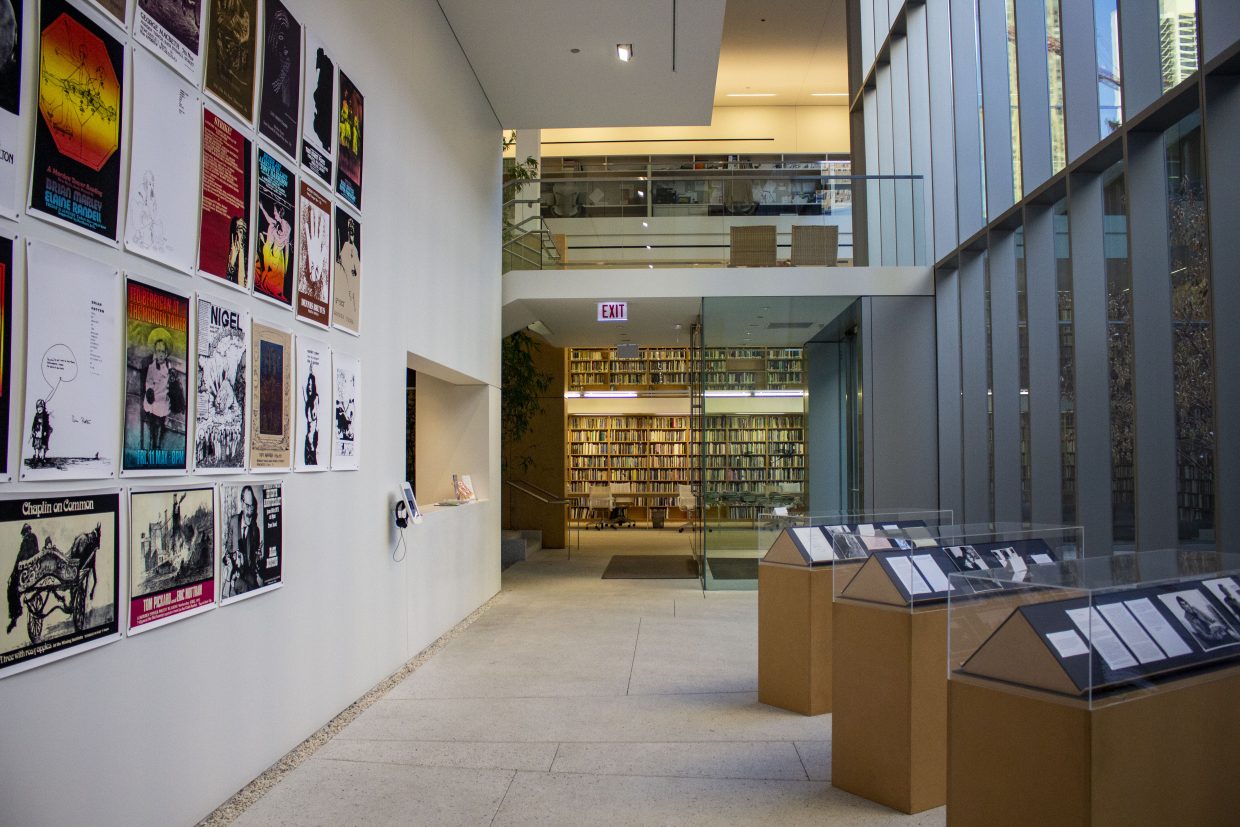
Poetry Foundation
2:00 pm
Your first stop is the Poetry Foundation, best known as the publisher of Poetry magazine. The award-winning building it’s housed in—a tranquil, light-filled and minimalist space designed by Chicago firm John Ronan Architects—is itself worth a visit. On a weekday afternoon, you can visit its library and exhibitions; come back at night for book and journal releases and its Open Door reading series.
*
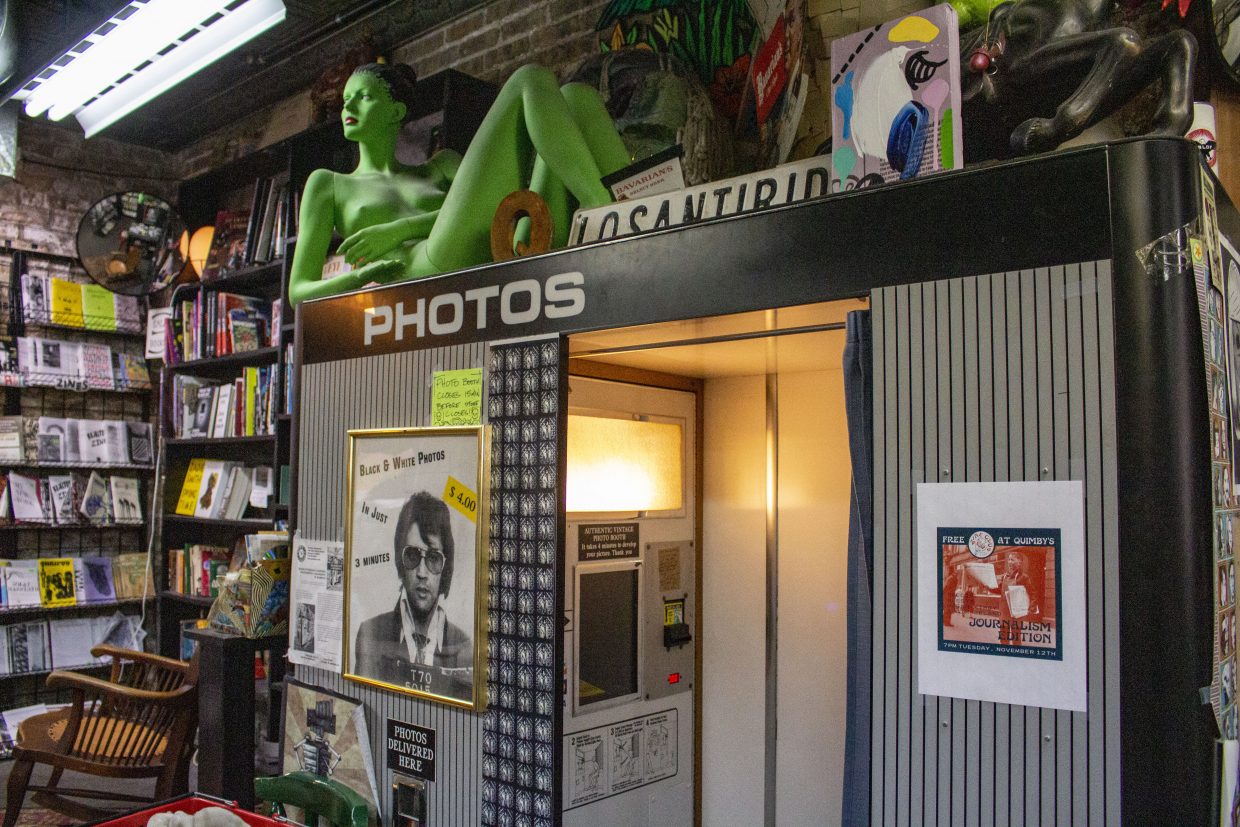
Wicker Park
5:00 pm
As chronicled in local poet and activist Kevin Coval’s latest book Everything Must Go, the forces of gentrification continue to remake Wicker Park, but its status as a center of literary culture in Chicago still holds. Start at Quimby’s, a great introduction to the Chicago DIY scene which features an unparalleled selection of zines, comics, and small press books. While you’re there, capture a memory of your visit in its vintage photobooth.
Just a block away, on Milwaukee Avenue, is the Wicker Park Secret Agent Supply Co., aka 826CHI; as with all of 826’s locations, a themed store (in Chicago, it’s a spy store) acts as a storefront for a literacy nonprofit, with a select group of publications by its students and other authors. Young Chicago Authors has its headquarters on Milwaukee Avenue too, and is one of the most influential literary organizations in the city; its programs include the writing workshop Check the Method and its youth open mic WordPlay, as well as its annual youth poetry competition Louder Than a Bomb.
For a strong selection of new literary and genre fiction and a busy event calendar, check out Volumes Bookcafe; as a bonus, you can get your coffee (or wine) fix here. A few blocks down Milwaukee, used bookstore Myopic Books spreads over three homey, ramshackle floors, and, as it stays open until 11 pm daily, is a great place for a late-night browse—but if you want to avoid a scolding, be sure to check your backpack and put away your cell.
*
Chopin Theatre
8:00 pm
Take Milwaukee Avenue south and cross Division Street—and if the name of the street rings a bell, you might be thinking of Studs Terkel’s Division Street America, an oral history of the street. Just across from the Nelson Algren Fountain in the Polish Triangle, the Chopin Theatre, which has been in operation since 1918, always has something interesting going on, from Guild Literary Complex readings to Manual Cinema shadow puppetry. Not to mention that its first floor café and plush, bohemian downstairs bar and lobby significantly add to its charm.
*
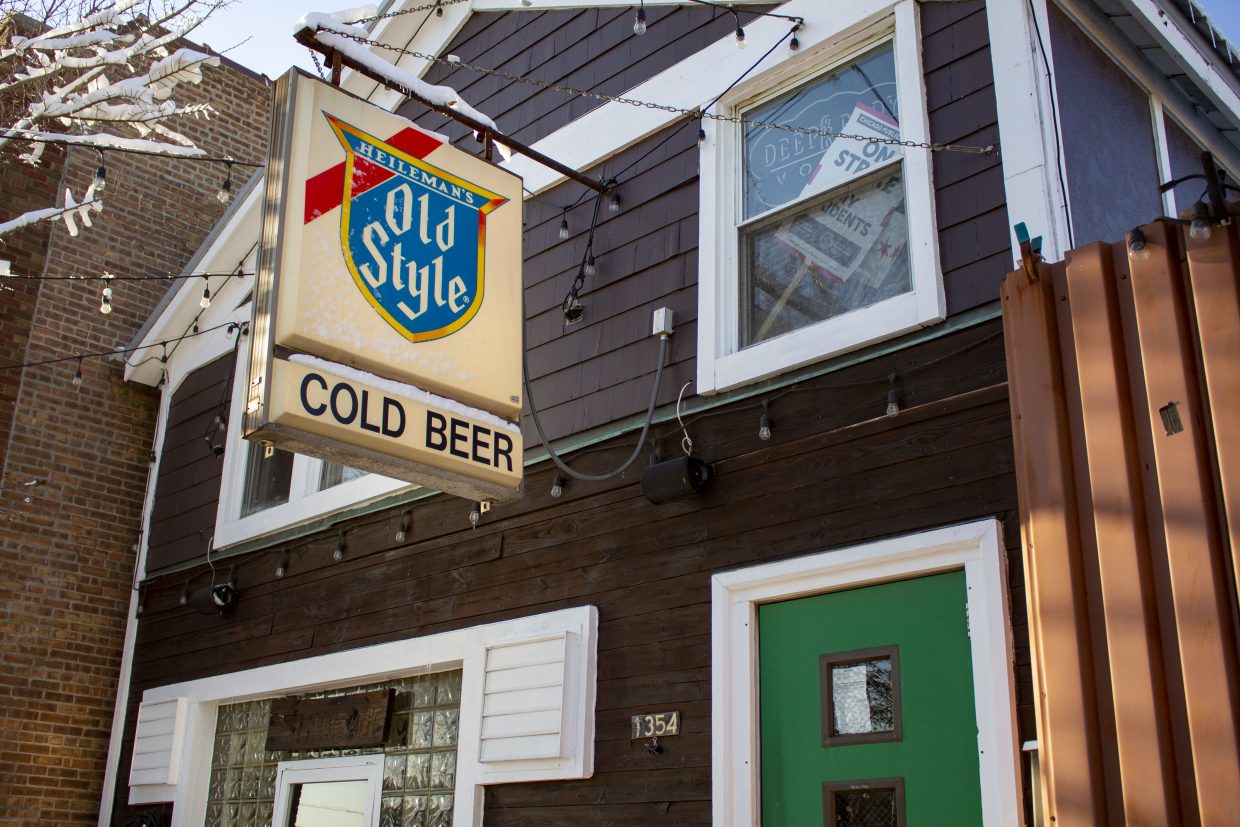
The Hideout
11:00 pm
It’s called the Hideout for a reason: it’s tucked down a side street in an industrial area ill-served by public transit, and its only signage is an Old Style sign. You don’t stumble upon the Hideout, you have to seek it out. But seek it out you must. Come for the music, the comedy, the community events, live lit, and book releases from Lynda Barry and Belt Publishing, to name recent examples, all preceded by an opinionated, eloquent introduction from co-owner Tim Tuten.
While the Hideout doesn’t have food, you may be blessed with a visit from the storied Tamale Man, who makes late-night rounds in bars with his cooler of goods and appears when he’s most needed. The encroachment of a massive new development next door means the Hideout’s name won’t make sense for much longer, so enjoy it while you can.
*
· SATURDAY ·
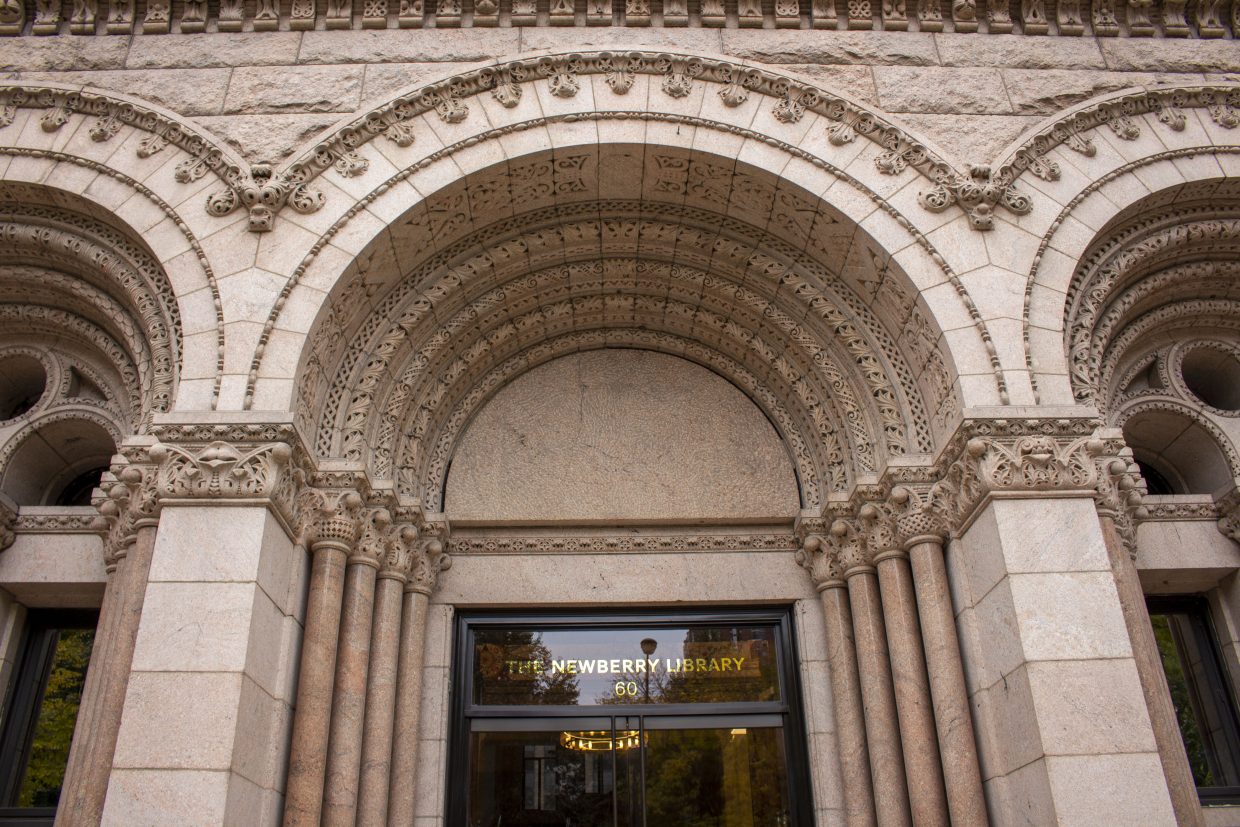
River North/West Loop
10:00 am
Start your day off with a trip to the Newberry Library, a rare noncirculating library whose stacks are open to all: Anyone over the age of 14 can register at its welcome center and gain immediate access to its holdings. Items you can access include a copy of a Shakespeare First Folio and Ben Hecht’s Oscar. Explore its two exhibition spaces, one featuring a rotating display of items from the library’s collection and another featuring a themed exhibition, often with a Chicago connection. If you want to know more, take one of its free public tours at 10:30 am every Saturday; ask to see the old book lift in the east stairwell if you want to see what inspired the cage in Audrey Niffenegger’s book The Time Traveler’s Wife. For some great used book finds, come back in July for the Newberry Library’s popular book fair.
Exiting the Newberry and continuing south, you’ll encounter two wonderful bookstores. Semicolon Bookstore & Gallery, which opened just this year, features a select group of titles, as well as a basement art gallery; it also hosts community events, like the Chicago branch of local musician and poet Noname’s book club. Open Books is one of Chicago’s biggest and most beloved used bookstores; proceeds of its sales go to its youth literacy programs.
*
The Loop
1:00 pm
Head south of the Chicago River to the American Writers Museum; established in 2017, this worthy addition to Chicago’s literary scene features both permanent and temporary exhibitions. Visit its Chicago Gallery for a great primer on important local authors, or participate in one of its interactive exhibits, which range from touchtables to a manual typewriter, where visitors have a chance to contribute to a story of the day started by museum staff. The museum also maintains an active event schedule, often featuring nationally touring authors.
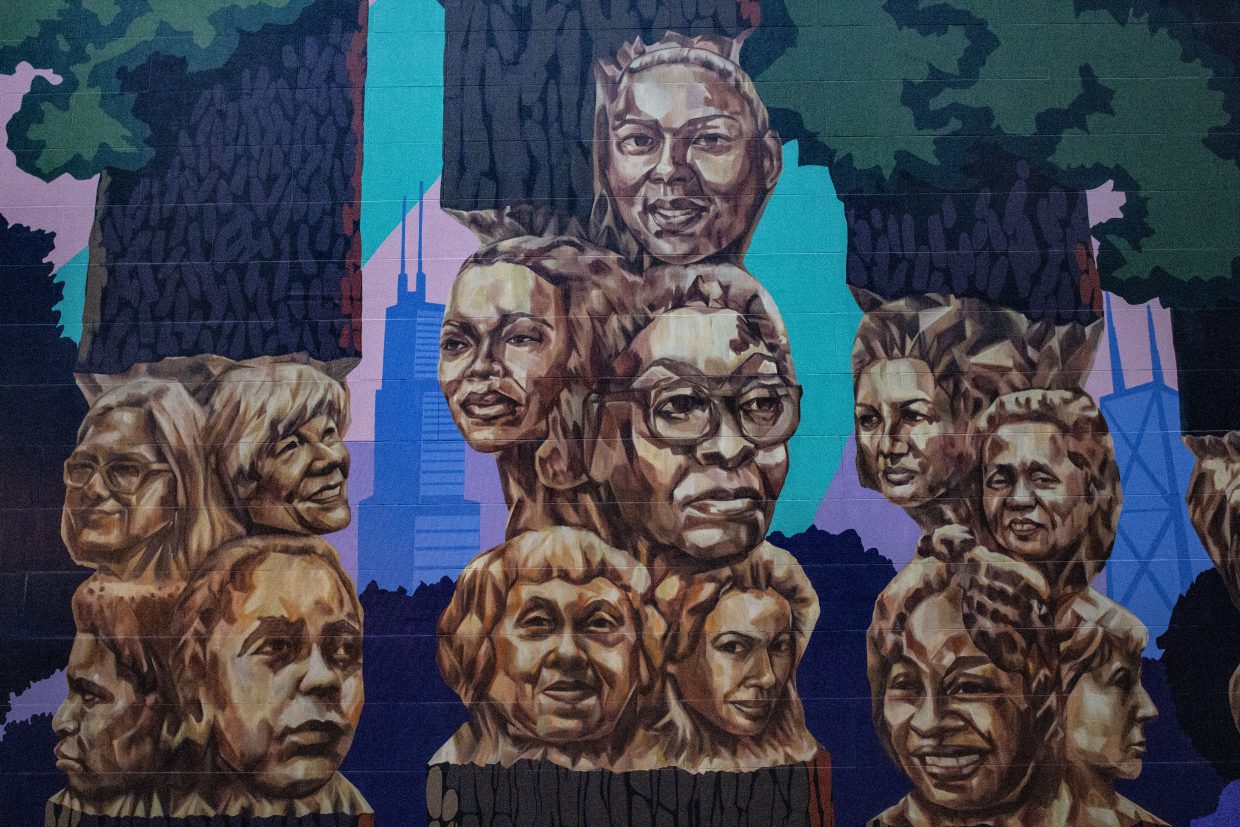
Next, head south down Michigan Avenue. Cut down the alley on the west side of the Chicago Cultural Center and take a look at the mural on the side of the building, created by renowned Chicago artist Kerry James Marshall. It features 20 women who have played a significant role in Chicago’s cultural scene. (A challenge: try to spot literary icons Gwendolyn Brooks and Sandra Cisneros.) The Chicago Cultural Center was Chicago’s first central public library, and now hosts free programs and exhibitions; its interior boasts the largest stained glass Tiffany dome in the world.
South on Michigan Avenue, duck into the Fine Arts Building, the birthplace of Poetry magazine and once the home of Frank Lloyd Wright’s studio. The seventh-floor bookstore he designed is sadly long-gone, but you can take one of Chicago’s last manual elevators to the second floor to the Dial Bookshop. Named for a literary magazine once headquartered in the building, it sells both old and new books, with a special selection of collectible books, as well as stationery and prints; it’s also one of Chicago’s most beautiful bookstores, with a great view looking out onto Grant Park.
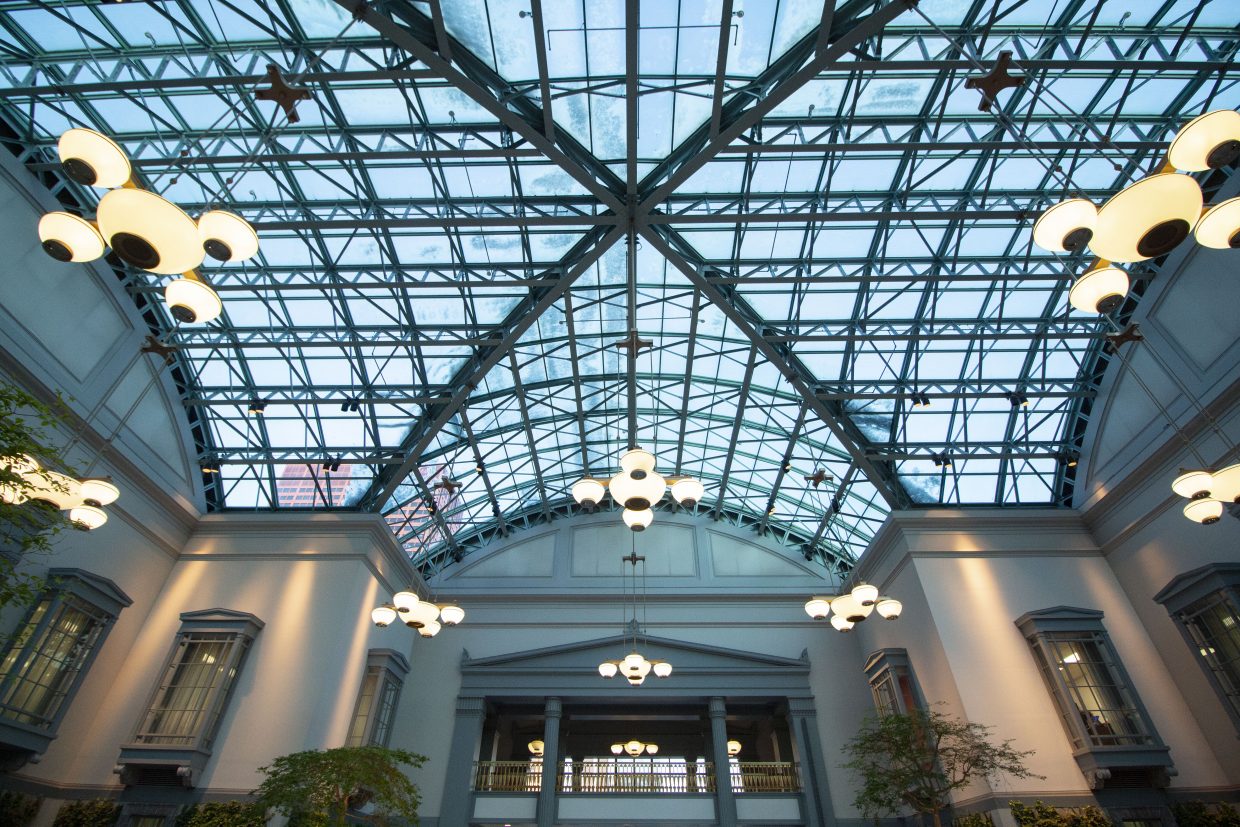
A block to the west, the Harold Washington Public Library is Chicago’s main branch; head to the ninth floor to the Winter Garden and there you’ll find an oasis of quiet and light, a great place to take a break. On the same floor, look for temporary exhibitions from the library’s collection, as well as a permanent exhibit about the library’s namesake, the first Black mayor of Chicago.
*
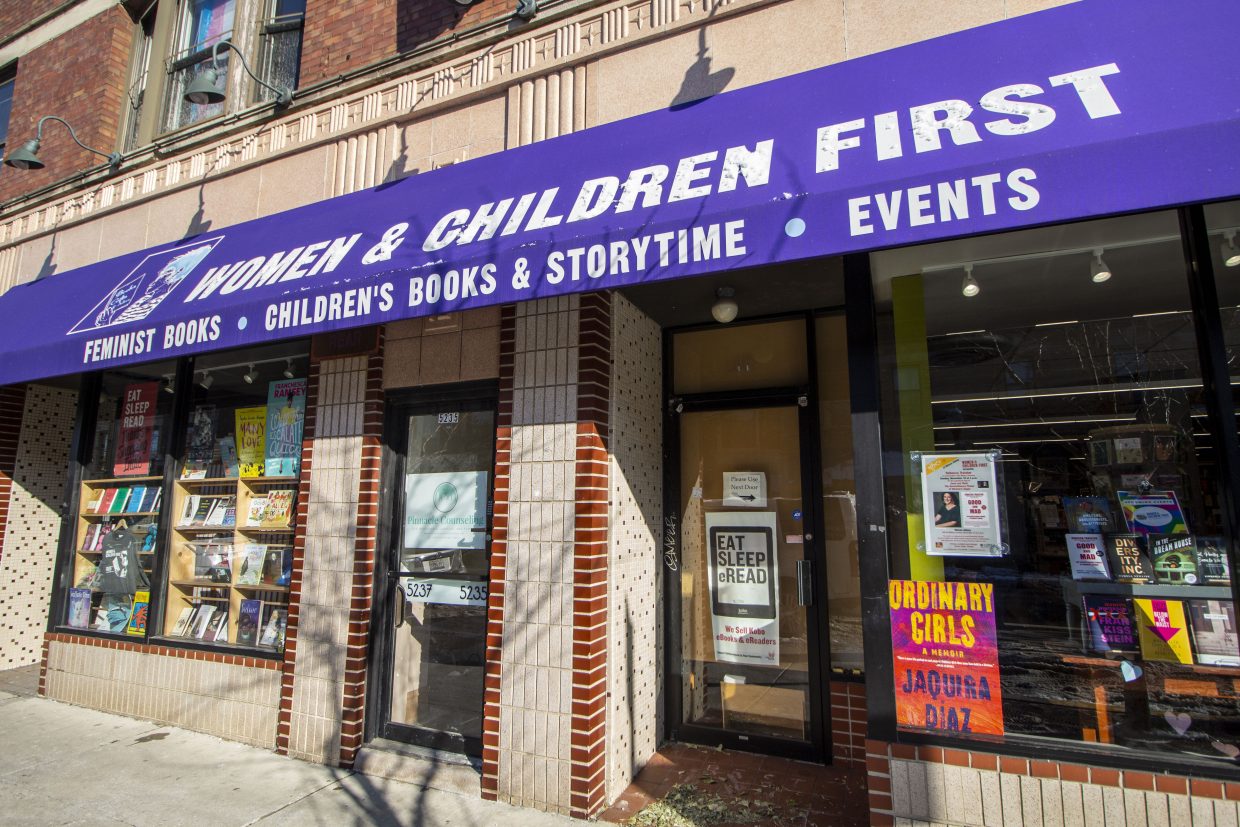
Andersonville
5:00 pm
You could spend several days downtown and still not cover all its literary sites, but if you are only here for a weekend, you should spend your Saturday night back in a neighborhood. Possibilities include, but are by no means limited to, Logan Square (City Lit Books, the Whistler, the Comfort Station, Café Mustache), Ukrainian Village (Read/Write Library, the Empty Bottle), and Pilsen (Pilsen Community Books, Simone’s); this itinerary sends you to the far north side, with Andersonville as your first stop. Celebrating its 40th year, Women & Children First is a neighborhood anchor and community hub, and Chicago’s only explicitly feminist bookstore, with strong activist and LGBT sections. While you’re there, buy a poem from its Poetry Machine, the proceeds of which benefit the city’s public art program. A block away, stop in at used bookstore Uncharted Books; meet Ramona, its resident dog, or attend one of its events, held in a secret room hidden behind one of its bookshelves.
*
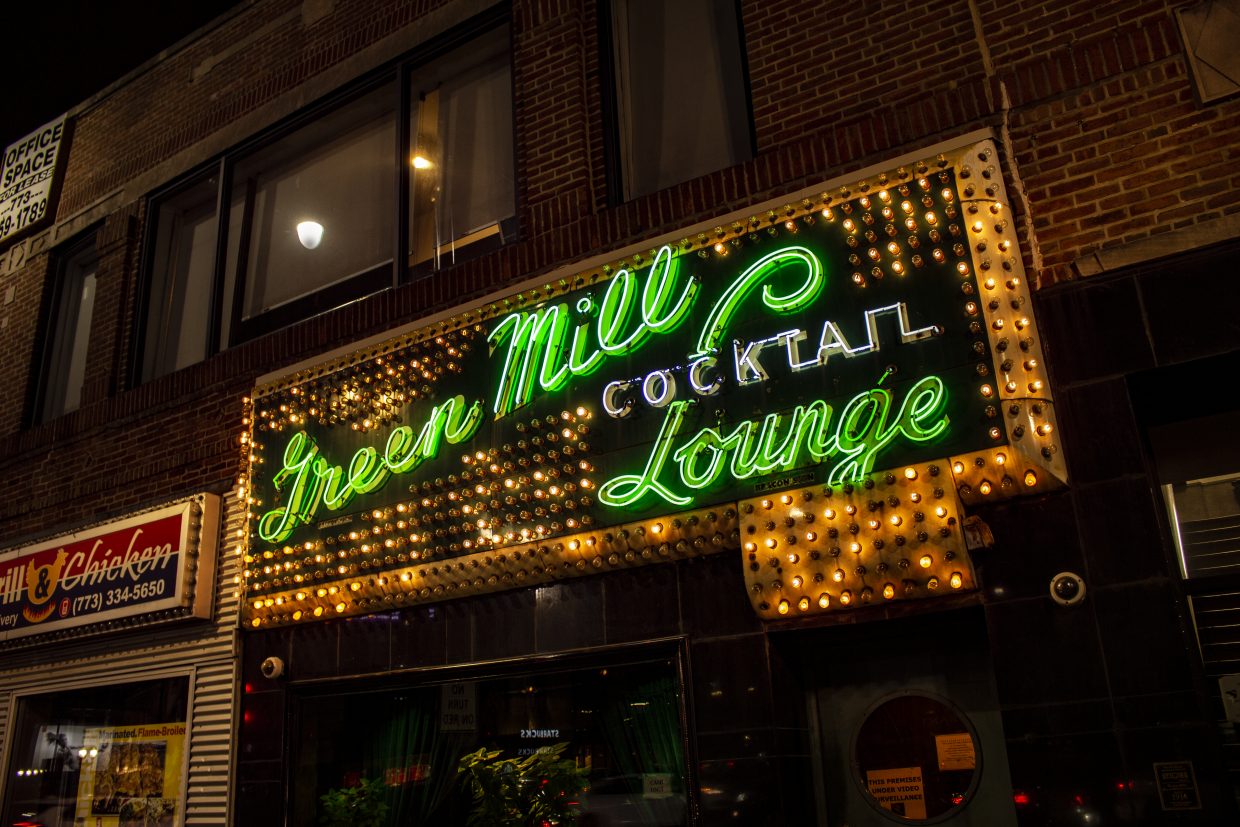
Green Mill
8:00 pm
One of the best jazz clubs in the world as well as a wonderful vintage hangout, the Green Mill also hosts two venerable lit series—the Uptown Poetry Slam on Sunday nights and the Paper Machete live magazine on Saturday afternoons. But if you’re here on a Saturday night, you’re here for the jazz. This audience comes to listen, so your full attention will be required.
*
The Neo-Futurist Theater
11:30 pm
For “immediate, unreproduceable events at head-slappingly affordable prices,” look to the Neo-Futurist Theater. Its popular show “The Infinite Wrench” features a dizzying 30 plays in 60 minutes. Everything about the show is interactive, from paying for entry (a roll of the dice influences your admission fee) to the order of the plays (which is based on numbers shouted from the audience). Reserve a ticket or arrive early to guarantee entry.
*
· SUNDAY ·
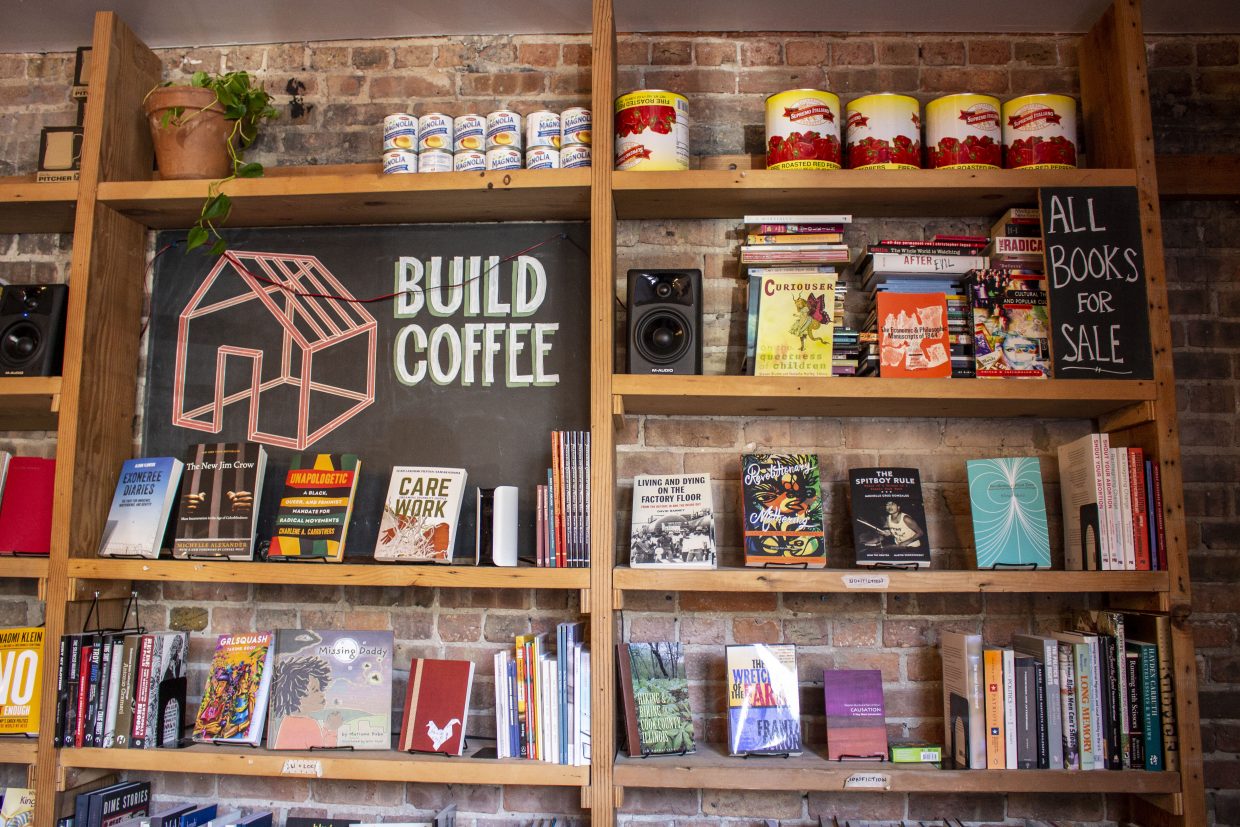
Hyde Park
9:00 am
Start the morning at Build Coffee; this café and bookstore offers a small but interesting selection of local zines and small press books. It’s located at the Experimental Station, a cultural hub that houses a variety of tenants, among them some of Chicago’s best journalism nonprofits—City Bureau, South Side Weekly, the Invisible Institute, and Borderless Magazine.
Just a few blocks north, the Seminary Co-op is neither in a seminary (though it used to be) nor is it a co-op (it recently changed its status from co-op to nonprofit). It’s one of Chicago’s most erudite bookstores, with a special emphasis on scholarly books—no surprise, given its proximity to the University of Chicago. It has events most days of the week; its podcast Open Stacks features some of them. Just around the corner, 57th Street Books is run by the same nonprofit, but features more general-interest titles, including an extensive children’s section. A few blocks away, Powell’s Books Chicago, the progenitor of the famous Powell’s Books in Portland, specializes in remaindered and used books, with an emphasis on the academic.
*
Stony Island Arts Bank
12:00 pm
As you go south, be sure to note beautiful Jackson Park, future (and controversial) home of the Obama Presidential Center. Head to the Stony Island Arts Bank, home of the Rebuild Foundation and site of the Johnson Publishing Archive + Collections, books and periodicals donated by the publisher of Jet and Ebony. If you want to find out more about the building, a crumbling bank acquired for $1 by founder and renowned artist Theaster Gates and stunningly rehabbed, go on the free public tour of the building at 12:15 pm.
*
Jane Addams Hull-House Museum
3:00 pm
At this point, you may be wondering why this itinerary has not yet included a writer’s residence or birthplace, since so many famous authors have a tie to the city. That’s because the only historic writers’ houses that you can step inside (Ernest Hemingway’s Birthplace Museum in Oak Park and the Frances Willard House Museum and Archives in Evanston) are outside the city limits, and too removed from the rest of the itinerary.
With one exception: the Jane Addams Hull-House Museum, on the University of Illinois at Chicago’s campus. More than just the writer and activist’s former residence, it’s also the site of the social settlement she founded. Preregister for a free public tour, or simply view its permanent exhibitions, which focus on the history of the settlement, and temporary exhibitions, which focus on social justice topics.
Back downtown, Addams is also, controversially, the namesake of a luxury hotel (the St. Jane Hotel in the historic Carbide and Carbon building). And that is perhaps an apt note on which to end, as it exemplifies some of the contradictions you will keep running up against when exploring this ever-evolving city.
Lynn Haller
Lynn Haller is a freelance writer, editor, and publishing consultant. Formerly an acquisitions editor and a literary agent, she is the co-organizer of the Chicago Book Expo and the Evanston Literary Festival. She is the author of seven books about design. Find her at lynnhaller.com.



















